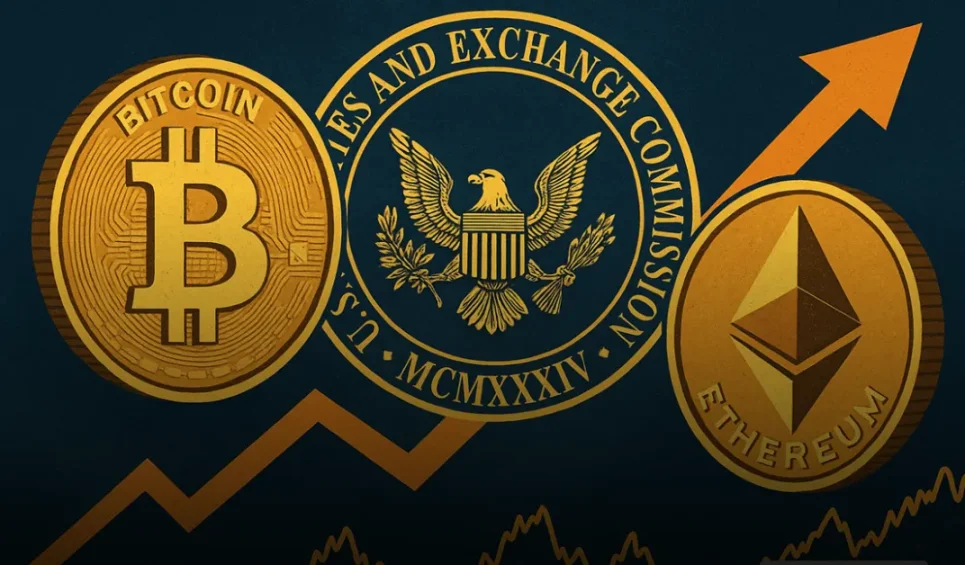Source: bitcoinist
Translation: Blockchain Knight
The SEC is gradually advancing structural reforms for Bitcoin and Ethereum ETFs. Previously, five products listed on the Chicago Board Options Exchange (Cboe) BZX simultaneously applied to change their cash-only redemption model to a physical redemption mechanism, which has long been widely used in commodity and stock ETFs.
The documents submitted later on July 22 cover the ARK 21Shares Bitcoin ETF and the 21Shares Core Ethereum ETF (jointly included in SR-CboeBZX-2025-010 Amendment No. 3), the WisdomTree Bitcoin Fund (SR-CboeBZX-2025-033 Amendment No. 1), and the Fidelity Wise Origin Bitcoin Fund and Fidelity Ethereum Fund (SR-CboeBZX-2025-023 Amendment No. 1).
Each amendment modifies the cash-only redemption clause in the documents approved in early 2024, replacing it with the phrase "cash or physical transactions," and adds detailed settlement processes for the direct transfer of Bitcoin or Ethereum between the trust custodian and authorized participants.
Bloomberg ETF analyst James Seyffart was the first to discover this coordinated action. He told fans on the X platform that these five documents are "another positive signal that Bitcoin and Ethereum ETFs are likely to gain physical redemption rights… This indicates that positive progress is being made internally at the SEC, and details may be undergoing adjustments."
To avoid misunderstanding, he added: "No, this is not for retail or ordinary investors to exchange ETF shares for the underlying assets, and vice versa. This only applies to authorized participants (i.e., large Wall Street institutions and market makers)… This will enhance the efficiency of existing and future cryptocurrency ETFs. But the vast majority of people won't even notice the difference, as the products currently on the market already have extremely high trading efficiency. This adjustment will allow cryptocurrency ETPs to be treated equally with other ETPs."
When discussing whether retail investors will be able to use the physical redemption process in the future, Seyffart added: "It would be very meaningful to see consumers able to exchange ETF shares for actual ETH at specific thresholds. I personally believe that such a redemption mechanism will eventually be realized, but it may take a long time. Step by step, some gold ETFs have already achieved this.

When the Bitcoin spot ETP was approved in January 2024, the SEC mandated a cash-only redemption model: authorized participants inject dollars into the fund, which then purchases cryptocurrency in the spot market; the reverse operation occurs during redemption. While this design addresses SEC Chairman Gensler's concerns about custody and settlement risks, it brings two major issues: the trust itself must participate in trading the underlying assets; and when spot liquidity is insufficient, the fund's net asset value (NAV) and share price may diverge.
The physical redemption mechanism returns trading control to authorized participants: when purchasing shares, authorized participants directly transfer Bitcoin or Ethereum to the fund's cold wallet; during redemption, they receive cryptocurrency instead of cash.
This structure is a standard model throughout the ETF ecosystem, which can narrow bid-ask spreads, reduce primary market imbalances, and provide significant tax advantages, as the combination of securities (in this case, crypto assets) is transferred in "physical" form, eliminating the need to sell within the fund to realize capital gains. The SEC itself has also pointed out that ETFs "may be more tax-efficient… because ETF shares can typically be redeemed 'in kind.'"
Commodity trusts that have adopted physical redemption provide a regulatory template for cryptocurrency issuers. For example, the SPDR Gold ETF allows authorized participants to exchange 100,000 fund shares for physical gold, a feature that ultimately enables individual investors to "obtain the physical gold corresponding to their shares through arrangements facilitated by brokers." Bitcoin and Ethereum trusts, by borrowing such language, claim to seek equal regulatory treatment with existing commodity ETPs.
As trading volume in the primary market grows, operational pressures are becoming increasingly prominent.
The 11 Bitcoin spot ETFs approved in 2024 have seen cumulative net inflows of nearly $55 billion since their launch; the market-making department needs to raise billions of dollars in funding every settlement afternoon at 4 PM, waiting for the trust to complete cryptocurrency purchases before closing out hedged positions. This not only occupies balance sheets but can also widen spreads during volatile periods. Once physical delivery is allowed, the market-making department can continuously acquire or hedge Bitcoin and Ethereum and directly transfer assets to the trust wallet on T+0 days.
免责声明:本文章仅代表作者个人观点,不代表本平台的立场和观点。本文章仅供信息分享,不构成对任何人的任何投资建议。用户与作者之间的任何争议,与本平台无关。如网页中刊载的文章或图片涉及侵权,请提供相关的权利证明和身份证明发送邮件到support@aicoin.com,本平台相关工作人员将会进行核查。




